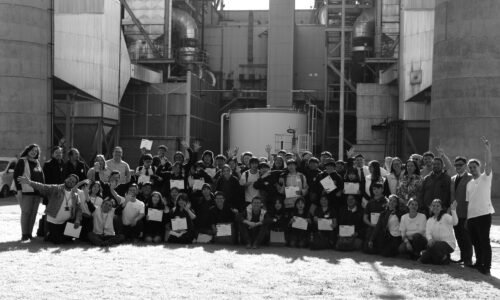
Ogichidaakwe is the Ojibwe word for female warrior spirit.(…) The day I visited, three activists had chained themselves to construction equipment and were subsequently arrested by the local police.
Migizi Camp vs. Line 3: The last battle for humanity
Ogichidaakwe is the Ojibwe word for female warrior spirit.
I recently had the pleasure of visiting the newfound Migizi Camp on the Fond Du Lac Reservation of northern Minnesota, where indigenous leader Taysha Martineau and dozens of volunteers from around the country are living and hosting daily actions in protest of the Enbridge Line 3 Pipeline.
The day I visited, three activists had chained themselves to construction equipment and were subsequently arrested by the local police. As we sat around a campfire to stay warm in the chilling -10℉ weather, the group quickly organized bail to keep up morale.
The fight against the Line 3 pipeline is grounded in the protection of indigenous communities and their natural resources. As Taysha explains, “The increase in violence against indigenous women who live along this pipeline route is something that we see immediately. But also, all of our waterways are connected, so if there is a spill anywhere, it affects our wild rice. Many of our elders still rely on wild rice to sustain themselves.”
Taysha, who uses she/they pronouns, told me, “I made a promise to my children that I would stop Line 3.” However, stopping the pipeline isn’t simply about protecting their ancestral homelands or their children. “If we don’t [stop the pipeline], it’s going to affect the global south. Our relatives down there are also indigenous to Turtle Island, and we have to stand in solidarity with them. This is the last battle for humanity, and Line 3 is the dying gasp of the oil industry.”
The Migizi Camp story is one of determination and dedication to climate justice. In January, when Taysha saw two bald eagles dancing above the property, they went outside to lay tobacco, then saw that the land was up for sale. Not even 20 yards away from the for-sale sign stood a sign announcing pipeline construction. Taysha immediately called up her co-organizer Jeffrey. Together they organized a crowdfunding campaign called “Land Back.” People involved with leftist movements began sharing the campaign and in under 30 days, Taysha and Jeffrey had enough money to buy the land. On February 9, they closed on the deal, began setting up bell tents, and have been holding space here since.
Taysha started walking door to door, meeting their neighbors, offering wild rice and venison meat so the neighbors knew what Migizi Camp stood for. When Taysha introduced themself to a neighbor, he proudly proclaimed, “And you’re gonna stop the pipeline!”
In the short term, Migizi Camp intends to stop Line, 3 but their long-term vision is a continued solidarity between all people of all races: “At the end of the day, it’s not just about stopping Line 3. It’s about growing together into better human beings. We’re out here to reawaken the Ogichidaakwe spirit and remind our elders that we are out here. We are Anishinaabe people first.”
I recently had the pleasure of visiting the newfound Migizi Camp on the Fond Du Lac Reservation of northern Minnesota, where indigenous leader Taysha Martineau and dozens of volunteers from around the country are living and hosting daily actions in protest of the Enbridge Line 3 Pipeline.
The day I visited, three activists had chained themselves to construction equipment and were subsequently arrested by the local police. As we sat around a campfire to stay warm in the chilling -10℉ weather, the group quickly organized bail to keep up morale.
The fight against the Line 3 pipeline is grounded in the protection of indigenous communities and their natural resources. As Taysha explains, “The increase in violence against indigenous women who live along this pipeline route is something that we see immediately. But also, all of our waterways are connected, so if there is a spill anywhere, it affects our wild rice. Many of our elders still rely on wild rice to sustain themselves.”
Taysha, who uses she/they pronouns, told me, “I made a promise to my children that I would stop Line 3.” However, stopping the pipeline isn’t simply about protecting their ancestral homelands or their children. “If we don’t [stop the pipeline], it’s going to affect the global south. Our relatives down there are also indigenous to Turtle Island, and we have to stand in solidarity with them. This is the last battle for humanity, and Line 3 is the dying gasp of the oil industry.”
The Migizi Camp story is one of determination and dedication to climate justice. In January, when Taysha saw two bald eagles dancing above the property, they went outside to lay tobacco, then saw that the land was up for sale. Not even 20 yards away from the for-sale sign stood a sign announcing pipeline construction. Taysha immediately called up her co-organizer Jeffrey. Together they organized a crowdfunding campaign called “Land Back.” People involved with leftist movements began sharing the campaign and in under 30 days, Taysha and Jeffrey had enough money to buy the land. On February 9, they closed on the deal, began setting up bell tents, and have been holding space here since.
Taysha started walking door to door, meeting their neighbors, offering wild rice and venison meat so the neighbors knew what Migizi Camp stood for. When Taysha introduced themself to a neighbor, he proudly proclaimed, “And you’re gonna stop the pipeline!”
In the short term, Migizi Camp intends to stop Line, 3 but their long-term vision is a continued solidarity between all people of all races: “At the end of the day, it’s not just about stopping Line 3. It’s about growing together into better human beings. We’re out here to reawaken the Ogichidaakwe spirit and remind our elders that we are out here. We are Anishinaabe people first.”
Artículos Relacionados
¿Quieres estudiar sobre sostenibilidad? Luksic te beca
La beca Luksic puede ser tu oportunidad para estudiar una maestría en la ciencia del manejo sostenible en la Universidad [...]
Leer más2811: una Empresa B comprometida con el triple impacto
La certificación de Sistema B corrobora que 2811 produce triple impacto: social, económico y ecológico
Leer másInnovación y educación climática: Climathon en Renca 2023
2811 y Generadora Metropolitana llevaron a cabo una Climathon en Renca, comuna de Santiago de Chile. El tema fue la [...]
Leer más


